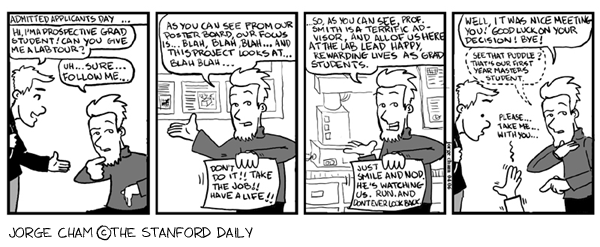Grad School: Is It How Everyone Says It Is?
Over the past year I've come home with projects that, according to my siblings, have led to high expectations of what grad school will be like. These include Kinect controlled helicopters (ie. body controlled), an auto-sending bedsheet that turns off the lights for you when you get into bed, 3D printed remote controls for a custom built game, and an interactive wall.
On many occasions I've been asked if grad school is "how everyone says it is," to which I hesitate and respond, "how do you think it is?" It's difficult to describe my experience without being biased. I think most see grad school as long hours in a windowless lab pipetting chemicals all day, or perpetual and impossible exams and papers for years and years. I can't say that some programs don't require any of that, but I can say that none of that matters as long as one is happy where they are. There certainly are and will be long hours, sometimes in a windowless lab. But my program, for example, revolves heavily around projects since it doesn't make sense to have exams most of the time. This may not be the case for everyone, and thus I wonder how to respond.
I used to think I should be careful when telling people that I've loved grad school so far in fear of leading them into a future they never wanted (e.g., lots of exams). But I realized that I'm equally happy building interactive walls as one who might be pipetting chemicals to yield a promising result. Finding the right graduate program is the key to having a fulfilled, fun, and successful experience.
I spent an entire year in the wrong program before I realized where I wanted to go. I blame this on myself. I didn't do my research on what the program was like. I didn't go in to meet the faculty. I never got a tour of the lab. I never talked to any of the students. All I did was go to orientation, and even then something felt wrong. Picking the right graduate program is much more difficult than choosing the right undergraduate program. From now on, you'll be working on a much more intimate level with the faculty and grad students. This will be your family for the next 4+ years. "The lab" will be your second home.
And so, in addition to the obvious "does this program fit my career goals" question, I recommend doing several things to do to ensure your happiness should you choose to continue your education:
- Go to orientation. (That's an easy one.)
- Ask the faculty personally give you a tour of the lab you'd potentially be working in. Visit your new home away from home. The environment in which you will be working in will be critical to your happiness.
- Don't talk to administrative advisors. They usually won't have any useful input for you. Your academic advisor will be your new parent. Talk to him/her personally.
- Ask the faculty introduce you to your soon-to-be new colleagues. This includes both faculty and current graduate students.
- Get to know the program itself. Maybe even shadow a student for a day.
- Ask the students and/or faculty to show you off-campus lifestyle over some coffee/lunch/dinner. This is very important because it achieves two things:
- It will give you a feel for what type of city the school is located in, and
- It will give you insight into what the students and faculty are like on a personal level. You'll be spending a lot of time outside of work with these people as well. You'll want to know how socially inviting they are, whether or not they feel "right".
In the end, it will definitely be like this... but, should you choose wisely, you'll still love it. :)
